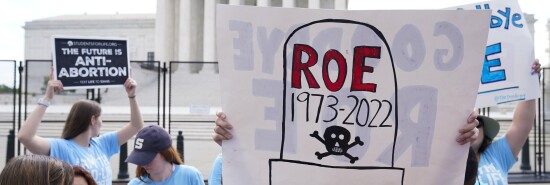
A year later, life and democracy are the big Dobbs winners
Washington Examiner
Video Embed
It’s not often that a Supreme Court decision can be directly traced to the saving of thousands of lives.
On this first anniversary of Dobbs v. Jackson Women’s Health Organization, though, the overwhelming scientific consensus is that about 60,000 more babies are alive today because states were finally allowed again to pass laws protecting the unborn.
TRUMP HAS NO PLAN TO WIN IN 2024
Those 60,000 lives alone are reason enough to celebrate Dobbs, but the decision has also proved to be a huge win for democracy in general and our Constitution in particular.
As Justice Brett Kavanaugh eloquently noted in his concurrence, “this Court will no longer decide the fundamental question of whether abortion must be allowed throughout the United States through 6 weeks, or 12 weeks, or 15 weeks, or 24 weeks, or some other line. The Court will no longer decide how to evaluate the interests of the pregnant woman and the interests in protecting fetal life throughout pregnancy. Instead, those difficult moral and policy questions will be decided, as the Constitution dictates, by the people and their elected representatives through the constitutional processes of democratic self-government.”
And that is exactly what has happened.
Fourteen states, including Alabama, Missouri, and Texas, ban abortion entirely. Georgia has a six-week ban, and Nebraska bans abortion after 12 weeks. Arizona and Florida ban abortion after 15 weeks, Utah after 18, and North Carolina after 20. Other more liberal states, such as California and Colorado, allow abortion up until birth.
Virtually every state, from far-left California to deep-red Texas, has had some sort of democratic action on abortion since the Dobbs ruling. California added abortion protections to their state’s constitution by referendum last November. The Texas legislature, which passed a “trigger law” before Dobbs prohibiting the procedure, has since passed a unanimous bipartisan clarification of their abortion ban, making it clear that “reasonable medical judgment” can be used to save the life of a pregnant woman including treatment of ectopic pregnancies and premature rupture of membranes.
The Dobbs decision by no means settled the abortion debate in this country. Quite the opposite. Abortion policy is, if anything, more contentious than ever. And it has been a huge boost to the Democratic Party. Facing what should have been a disastrous midterm election based on a failing Biden economy that has delivered nothing but declining real wages for working Americans, the Democrats campaigned almost exclusively on abortion and actually added seats in the Senate.
CLICK HERE TO READ MORE FROM THE WASHINGTON EXAMINER
In Pennsylvania and New Hampshire, abortion was a central issue and Democrats cruised to victory. Republicans in 2022 tended to do better in states where abortion was secondary to inflation.
Across the country, voters have complex, varied, and often inconsistent beliefs about abortion. It is a feature, not a bug, of our federalist constitutional system that after Dobbs our nation’s abortion policies are just as complex, just as varied, and just as inconsistent.
